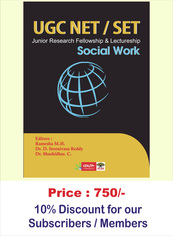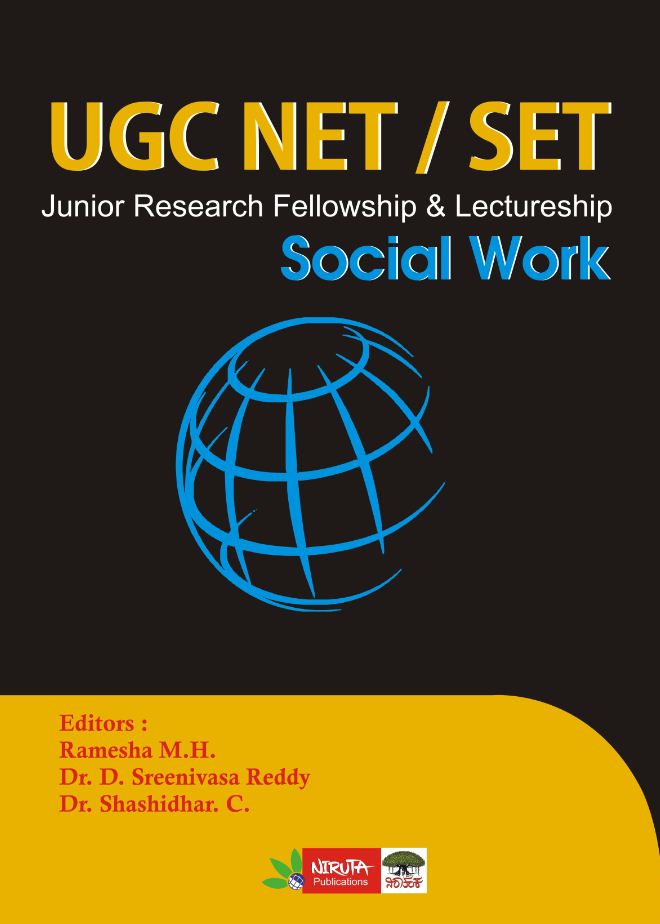|
Introduction: Social development as a process and an approach to social well-being is not an independent and autonomous concept. And further, social development strategies are not mutually exclusive, but can be integrated to achieve social development goals in conjunction with the dynamic process of economic development (Midgley, 1995:139). The proponents of social development, on the country, refute some of the basic assumptions regarding the percolation of economic development effects to promotion of social development. The argument advanced is that economic development parameters of development paradigm in the developed as well as in developing countries have resulted in the creation of islands of prosperity in the midst of an ocean of poverty. The growth, in terms of material prosperity, has made ‘man’ an economic being, blunting his social sensitivities, freezing his finer instincts and emotions, converting him into a self-centered, selfish and self-seeking person oblivious of his social obligations to help all those who are run down in the race of development and whose lives are characterized by fear insecurity, want, dearth, disease and despair. The trickle-down effects of economic growth hardly reach the mass of pauperized persons. Had that been so, the developed western nations may not be having a substantial proportion of their population living in property. In specific terms, social development goals aim at: - Promotion of social progress and betterment of human condition based on human dignity, equality, respect, mutual responsibilty and cooperation. - Placement of people at the centre of development and the economy at the service of human needs. - Integration of economic and social policies to make them mutually supportive. - Recognizing that sound and broad-based economic policies are necessary foundation to achieve sustainable social development - Promotion of a just distribution of income and access to resources through equity and equality of all levels - Strengthening of civil society and enabling people to achieve satisfaction of basic needs and to realize their dignity, safety and creativity. - Empowering people to strengthen own capacities. The characteristics of social development: (a) The needs and aspirations of all people; (b) Their empowerment to maximize their capacities, resources and opportunities; (c) Enhancement of people’s rights, resources and potentialities to enable them to lead satisfying lives and contribute to the well-being of their families, their communities and to their society at large; (d) A fair distribution of the benefit of development; (e) Facilitation of structural changes; and (f) Promotion of a development perspective in social welfare. Given the social and econamic inequalities and the unsatisfactory conditions of life for a development substantially large section of society, the social science discourse on deveolpment paradigms conceives social development as a true indicator of human development.The preferred visions of development desires that human development should occupy a centre stage and should emerge as an ultimate goal of development planing. Large number of our social science writing have shown preference for that vision of development which results in the enhancement of the quality of life (in both moral and material sense), especially for the resource-poor sections of society,whose basic needs often remain numet and whose social and econamic empowerment is an avowed objective of development planing.The development debete tn the early eighties shifted to social aspects of development,as is being currently examined in the social science literature. In recent years there has appeared a lot of literature on social development and the subject has been discussed at length in the world summit on social development held in march 1995 at copenhagen.The documents arising out of the summit, when read along with our own writings on social development, underscore the fact that social development, while being an old concept (Dube,1994;83) has acquired new meanings and messages. It is apparently more comprehensive than economic development. The term social development. As understood in the UN quarters broadly refers to improvements in human well-being, to development that it not strictly economic or market driven, and to improvements in the quantity and quality of public or social sevices. The Central Tenets of Social Development are:
In the light of its central tenets,social development requires modification conducive to eradiation of poverty, promotion of productive employment and acceleration of social integration (UNESCO,1994:9). It means policies and programmes to reduce and eliminate polarization of societies, social exclusion, unemployment and poverty and to provide opportunities for the disadvantaged persons and groups to improve their living conditions (UNESCO,1994:10). The aim of social development is to effect social well-being, i.e., the ability of every human being to satisfy his/her basic needs and achieve a satisfactory quality of life within the environment of equity, social justice and human dignity. Social development calls for strategic investment in health, education and social services, and necessitates access of the underprivileged to means of economic well-being. Sound and broad-based economic policies with sufficient social safegruads and necessery foundation to achieve sustained social development. In connection with social development, two allied concepts,namely, ‘human deveopment’ and ‘sustainable human development’ find frequent mention in the current social development debate,especially when the issue of sustainability is raised. Human development tended to be equated to with human resource years that human development has taken on a deeper meaning by recognizing that development is sustainable only when human being are increasingly capable of taking charge of their destiny. The concept of human development implies people centred development, a development that is focused o people, their needs and aspiration. The ultimate objective of development is to improve human well-being and the quality of people’s lives. The concept of sustainable human development lays emphasis on the development of social capital in conjunction with the development of physical capital.The argument is that without social capital other froms of capital cannot be mentioned or used properly. The concept of social capital is helpful because it identifies a founction of social structure . social capital is considered the key to more humane and sustainable form of development , a development that improves the ability of the collectivity to make decision . The concept of social capital emphasizes the empowerment of the disadvantaged people, suggesting their involvement in decisions affecting their life. Meaning of Sustainable Development: The concept of sustainable development offers an alternative design for development, which by definition, should be environmentally benign and eco-friendly. It implies that productive assets available to future generations should not be unfairly diminished. It highlights symbiotic relationship between consumerist human race and productive national systems. It suggests that a healthy environment is essential to sustainable development and healthy economy. It tells that economic development which erodes natural capital is often not successful. It further implies that environmental mistakes need not be repeated, as past patterns of environmental degradation are not inevitable. The term sustainable development was brought into common use by the World commission on Environment and development (the Brundtland commission) in its seminal report (1987) called Our Common Future. A review of these definitions suggests that despite a wide acceptance of the concept of sustainable development no single definition is yet available which everybody accepts (De Groote, 1987:123), and hence, ecologists, Conservationists and economists, all have different views. Barbier (1987) aptly summed up the situation-the totality of sustainable development is yet difficult to grasp analytically. How-ever, it clearly appears that most of definitions are built upon the view expressed by the Brundtland commission: “sustainable development is development that meets the needs of the present without compromising the ability of future generations to meet their own needs (world commission, 1987)”.this definition contains within it two concepts: (1) The concept of ‘needs’, especially the essential needs of the world’s poor to which overriding priority should be given; and (2) The idea of limitations imposed by the state of technology and social organization on the environmental ability to meet present and future needs (world commission on environment and development (1987:43). Principles of Sustainable Development:
Subscribers please login to access full text of the article
New 1 Year Subscription to Digital Archives at just Rs.500
0 Comments
Your comment will be posted after it is approved.
Leave a Reply. |
UGC NET Training for
Social Work We are pleased to announce the training programme on “UGC NET Social Work”. The details of which are as under. It covers in detail the UGC NET Social Work syllabus and previous question papers.
Categories
All
|
SITE MAP
SiteTRAININGJOB |
HR SERVICESOTHER SERVICESnIRATHANKA CITIZENS CONNECT |
NIRATHANKAPOSHOUR OTHER WEBSITESSubscribe |
MHR LEARNING ACADEMY
50,000 HR AND SOCIAL WORK PROFESSIONALS ARE CONNECTED THROUGH OUR NIRATHANKA HR GROUPS.
YOU CAN ALSO JOIN AND PARTICIPATE IN OUR GROUP DISCUSSIONS.
YOU CAN ALSO JOIN AND PARTICIPATE IN OUR GROUP DISCUSSIONS.
|
|



 RSS Feed
RSS Feed





